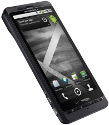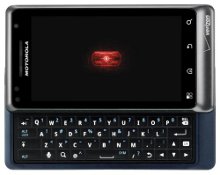Motorola to split into consumer (Android) and enterprise (Windows) companies
Dec 2, 2010 — by LinuxDevices Staff — from the LinuxDevices Archive — 3 viewsMotorola Inc. announced it will split into two companies on Jan. 4, separating the “Motorola Mobility” division that makes Android smartphones from the “Motorola Solutions” division responsible for enterprise handhelds running Windows Mobile. The separation will benefit stockholders, customers, and employees alike, the company claims.
Motorola says its long-planned split into two different companies will be made before the stock market opens on Jan. 4, 2011. According to the company, current Motorola Inc. stockholders will receive one share of Motorola Mobility stock for every eight shares of Motorola common stock they have; after that, a 1-for-7 reverse stock split will take place.
From Jan. 4 forward, Motorola Inc. will change its name to Motorola Solutions, Inc., and will begin trading on the New York Stock Exchange (NYSE) under the ticker symbol MSI. Meanwhile, Motorola Mobility Holdings, Inc. will begin trading on the NYSE under the ticker symbol NNI.
Although the split had been discussed for years, Motorola first announced formal plans for it back in February. At the time, David Dorman, chairman of Motorola's board of directors, stated, "We believe this structure provides significant operational and strategic flexibility for both companies, positions them for future success and enhances long-term shareholder value."
According to an unbylined Associated Press report, the split is partly the result of pressure from investor Carl Icahn, who as of August owned more than 10 percent of Motorola Inc. It is also "motivated by the desire to present two simple stories to investors, rather than one complicated one," the story continues.
Paging Dr. Jekyll …
At the risk of over-simplifying, we'd say that Motorola also appears to be splitting into anti-Microsoft and pro-Microsoft camps. Motorola Mobility, the manufacturer of consumer smartphones, used to be a major producer of Windows Mobile devices, but has bypassed Windows Phone 7 and dived deep into the production of handsets running Android. 
Motorola's third quarter earnings report showed $109 million in profits, based in large part on hot sales of the Android-based Droid X (pictured at left) and Droid 2 (below, right). Other new Android models include a business focused Droid Pro.
Meanwhile, Motorola has also been playing legal ping-pong with Microsoft regarding patents and licensing agreements tied to Android.
 Motorola Solutions, meanwhile, is heavily — and exclusively, as far as we're aware — committed to Microsoft operating systems for its popular enterprise handheld computers, such as the recently announced MC65. It has employed Windows CE and Windows Mobile, and in June was a key partner in Redmond's launch of the Windows Embedded Handheld operating system.
Motorola Solutions, meanwhile, is heavily — and exclusively, as far as we're aware — committed to Microsoft operating systems for its popular enterprise handheld computers, such as the recently announced MC65. It has employed Windows CE and Windows Mobile, and in June was a key partner in Redmond's launch of the Windows Embedded Handheld operating system.
Motorola's release yesterday noted that Motorola Solutions will be headed by Greg Brown, who, among other things, "led the $3.9 billion acquisition of Symbol Technologies, the second largest transaction in Motorola's history and an important strategic move to strengthen Motorola's Enterprise Mobility business." (Subsequently, Symbol's existing Windows-powered handhelds were rebranded as Motorola products until the company could come up with its own original devices.)
As the AP story noted above says, the businesses that will become the Android-oriented Motorola Mobility had $2.9 billion in sales in the most recent quarter, compared with $1.9 billion for Motorola Solutions. However, the $321 million in operating earnings in Solutions, which offers a much broader product range beyond handhelds, dwarfed the $3 million the Mobility made during the same period.
Motorola Solutions is responsible not only for Windows handheld computers, but also for a wide-variety of radio-based products — including the two-way headsets that may sometimes be seen getting hurled to the ground by irate NFL coaches. It also produces data capture and Wi-Fi security products, but relinquished a business selling network equipment for cellular providers to Nokia Siemens Networks earlier this year.

Motorola's Linux-based, circa-2007 VIP1510 STB
"The strategy of Motorola Inc. and the decision we've made was all driven for all the right reasons," Gene Delaney, executive vice president of Product & Business Operations for Motorola Solutions, was quoted as saying by our sister publication eWEEK. "It was not driven by any specific person. It was a holistic strategy focused on how best can we serve our customers. It's all about focus, and now we can have a laser focus on our customers on both ends of the business."
Delaney is said to have added that Motorola continues to "strengthen and expand" its Solutions portfolio, and that, despite difficult global economic times, "like last year," Motorola invested in the business the same dollar amount that it had in past years. The company continues to be committed to providing enterprise and government customers with "compelling solutions" and to "helping our customers to perform better," he told eWEEK.
Further information
More information on the separation of Motorola Mobility and Motorola Solutions, including a webcast recorded yesterday at the Credit Suisse 2010 Annual Technology Conference, may be found on Motorola's investor website, here.
This article was originally published on LinuxDevices.com and has been donated to the open source community by QuinStreet Inc. Please visit LinuxToday.com for up-to-date news and articles about Linux and open source.